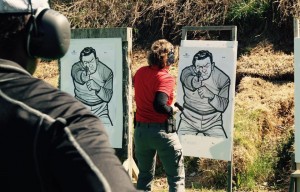Confession: Those of you who know me, know that I am of the Malcolm Gladwell-inspired moms who would rather her kids never step foot on the gridiron. When my son joined the football team, my husband and I passionately disagreed. (And I’m not a skittish mom — I let my son join the trap team when he was ten.) On the second day of practice, Austin was injured and has been “out of the game” for a total of 12 weeks, which has further created a division of household opinion. When I received this guest post by my friend David E. Prince, I read it skeptically. Begrudgingly, I concede he makes some good points. What do you think? Let me know in the poll below the piece! (And buy his book In the Arena: The Promise of Sports for Christian Discipleship for further extrapolation.)
Guest post by David E. Prince
 Dear moms and dads, for the sake of safety, consider letting your sons play football.
Dear moms and dads, for the sake of safety, consider letting your sons play football.
You read that correctly, for the sake of safety. Such a statement sounds strange in light of the fact we are constantly bombarded about the dangers of football. Our culture is catechized on the mantra that there is nothing more important than personal safety and I believe that makes it a dangerous place to live. The dictionary I keep on my office desk defines courage as, “the ability to do something that you know is difficult or dangerous.” Courage always demands a dose of danger. Our current cultural cult of safety treats willingly pursuing a difficult or dangerous task as foolish, sinful even—not heroic.
Recklessness and self-protecting safety both have the same sinful root: self-centeredness. A culture where everyone values safety over self-sacrifice is a perilous place to dwell. Biblically, safety is not a virtue, but self-sacrificial courage certainly is. Football is a physical game that demands a measure of physical courage. Aggressive physical contact and human pileups are a part of the game’s warp and woof. Football has become America’s favorite sporting obsession. The atmosphere and pageantry attracts countless people who are fans of the spectacle, even though they know very little about the zone read, Tampa 2 coverage, or the wing-bone offense. No other game combines brute force and elegant choreography the way football does. David Foster Wallace’s description of tennis, I find even more applicable to football, “Mozart and Metallica at the same time, and the harmony is exquisite” (Federer as Religious Experience,” New York Times, Aug 20, 2006).
Football does not reward either recklessness or self-protecting safety. Neither characteristics have a selfless root, which is necessary in quintessential team sport like football. My dictionary defines recklessness as “not showing proper concern about the possible bad results of your actions” and it defines self-protection as “the state of keeping yourself from being harmed.” Football players who do not show appropriate concern for the bad results of their actions and those who put self-preservation above the protection of their teammates are detriments to team success. Talented players who are reckless or self-protecting, usually end up watching the game from the sidelines on a football team, no matter their ability.
Many Christian parents feel the responsibility to teach their children moral and intellectual courage, but what about physical courage? David French recently wrote in National Review about America’s vanishing masculinity, “Today’s young males don’t have common touchstones for what it’s like to grow up to be a man…. spend time with teen boys today and you’ll find that their common experience revolves more around Call of Duty than around work or even sports.”
Some Christians would do well to remember that God does not only save our brains, he redeems our bodies as well. The believer is set apart to God as a unified whole, and yes, physical strength and toughness, surrendered to God, are unique ways a man should rightly glorify God with his masculinity.
My oldest son is now a college student. His football playing days ended with High School graduation but he learned things on the gridiron that he could have hardly learned anywhere else. He was valedictorian of his high school class, mannerable, and known as a well-rounded and kind young man. As a result, he was constantly told how wonderful he was and what a bright future he had. There were two exceptions, his parents, who still thought he had plenty to work on and his football coaches. His high school football coaches were not the least bit starry-eyed about his ACT score, GPA, or manners, in fact, if he did not make his block, they called him soft, lazy, or even football-stupid—I loved it. Where else was he going to be challenged in his masculinity like that? Where else, outside of the military, in contemporary American culture would he be forced to push himself and find physical courage he did not even know he had?
Whatever one thinks of the research data that links some NFL athletes to chronic traumatic encephalopathy (CTE), a degenerative brain disease that can result in mood disorders and dementia, it is wrongheaded to use that data to cast a dark shadow of football at all levels. An estimated 3.9 million people play organized football in America each year and of that number 68,000 play college and 1,696 are on NFL rosters. More than 95 percent of the people who participate in tackle football are under 18 years of age. It should be obvious there is a qualitative difference between playing youth football and playing in the NFL. A study published in Mayo Clinic Proceedings concluded long-term competitive distance running may damage one’s health and has a relationship to heart disease and premature death.[1] Should we tell youth not to run long distances? Of course not. As we normally reckon safety, most football is a safe, and getting safer.
Recently, I talked to the mom of a football player on the local high school team and she told me about their preseason party where players shared what the football team meant to them. One player said, “Football is why I go to school. My family has abandoned me, I have been arrested and in jail, but out here I am loved and challenged. This is my family. This team is why I do my homework, go to school, and I’m trying to make something of my life.” The next kid stood up and said, “I am the opposite. My parents have always been there, loving me, teaching me, supporting me, but my life is safe and easy. On this team I hit people, defend my teammates, and do things I wouldn’t do otherwise. I find out what I’m made of. I love this team.” I happen to think the world will be a better and safer place because of what both of those young men are learning on a football field and would be safer if more joined them.
David E. Prince is pastor of preaching and vision at Ashland Avenue Baptist Church in Lexington, Kentucky and assistant professor of Christian preaching at The Southern Baptist Theological Seminary. He is the author of In the Arena: The Promise of Sports for Christian Discipleship. He blogs at Prince on Preaching and frequently writes for The Ethics and Religious Liberty Commission, For the Church, the BGEA and Preaching Today
BUY YOUR COPY HERE:
Tell me what YOU think:
[1] James H. O’Keefe, Harshal R. Patil, Carl J. Lavie, Anthony Magalski, Robert A. Vogel, Peter A. McCullough, “Potential Adverse Cardiovascular Effects From Excessive Endurance Exercise,” Mayo Clinic Proceedings vol. 87, issue 6 (June 2012), 587-595.











